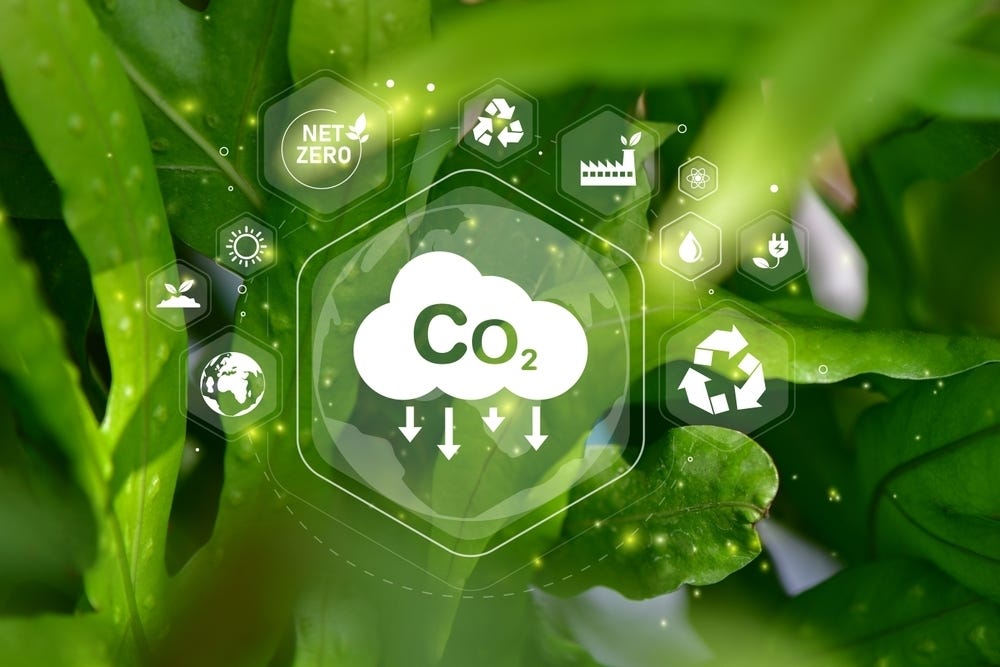Cutting-edge innovation captures CO2 from the air more efficiently than nature
Scientists are exploring innovative approaches to capture and convert carbon dioxide (CO2), a primary driver of global warming.

[Jan. 7, 2024: JD Shavit, The Brighter Side of News]
Scientists are exploring innovative approaches to capture and convert carbon dioxide (CO2), a primary driver of global warming. (CREDIT: RCGI)
In the relentless battle against climate change, scientists are exploring innovative approaches to capture and convert carbon dioxide (CO2), a primary driver of global warming. Among these groundbreaking methods, synthetic biology has emerged as a promising avenue for designing entirely new CO2-fixation pathways that surpass the efficiency of nature's own mechanisms.
In a significant development, researchers led by Tobias Erb at Max-Planck-Institute for Terrestrial Microbiology have devised a novel synthetic CO2-fixation pathway known as the THETA cycle, which may hold the key to revolutionizing our efforts to combat climate change.
At the core of this breakthrough is the concept of harnessing synthetic biology to create pathways for capturing CO2 more efficiently than natural processes. The THETA cycle, designed and constructed by Erb's team, represents a remarkable achievement in this pursuit. It incorporates several central metabolites as intermediates, with acetyl-CoA as its output—a central building block that plays a crucial role in cellular metabolism.
The distinguishing feature of the THETA cycle is its modularity, allowing it to be seamlessly integrated into the central metabolism of Escherichia coli (E. coli), a commonly used bacterium in scientific research.
Related Stories
This integration involves 17 biocatalysts, including the two fastest CO2-fixing enzymes known to date: crotonyl-CoA carboxylase/reductase and phosphoenolpyruvate carboxylase, both of which were originally found in bacteria.
These biocatalysts, unlike the sluggish RubisCO enzyme found in chloroplasts, demonstrate the ability to capture CO2 more than ten times faster. However, it's worth noting that natural evolution has not brought these potent enzymes together in the context of photosynthesis.
The THETA cycle achieves the conversion of two CO2 molecules into a single acetyl-CoA in one cycle. This molecule holds immense importance in various biotechnological applications, as it serves as a crucial precursor for numerous essential biomolecules, including biofuels, biomaterials, and pharmaceuticals.
Vials used for testing the THETA cycle of CO2 fixing. (CREDIT: MPI f. Terrestrial Microbiology/ Geisel)
To validate the functionality of the THETA cycle, the researchers initially constructed it in test tubes. Through a series of experiments guided by rational and machine learning optimization, they managed to enhance the acetyl-CoA yield by an astonishing factor of 100.
Taking the next step, the team divided the THETA cycle into three modular components, each of which was successfully integrated into E. coli cells. These modules were rigorously tested for functionality through growth-coupled selection and isotopic labeling techniques.
The overall strategy used in this work to establish the THETA cycle. The THETA cycle was designed in three modules, constructed in vitro, optimized through rational approaches and machine learning, before its three modules were implemented in E. coli. (CREDIT: Nature Catalysis)
Lead author of the study, Shanshan Luo, highlights the unique characteristic of the THETA cycle, stating, "What is special about this cycle is that it contains several intermediates that serve as central metabolites in the bacterium's metabolism. This overlap offers the opportunity to develop a modular approach for its implementation." However, closing the entire THETA cycle within E. coli remains a formidable challenge, as it requires synchronization with the bacterium's complex natural metabolism involving hundreds to thousands of reactions.
Nonetheless, the researchers emphasize that the goal extends beyond merely demonstrating the complete cycle in vivo. The THETA cycle presents the potential to serve as a versatile platform for producing valuable compounds directly from CO2, thereby offering a glimpse into a sustainable and carbon-neutral future.
In vitro demonstration and optimization of THETA. A simplified scheme of THETA 3.9.9. Modifications from the original design (shown in Fig. 1b) are marked in teal. (CREDIT: Nature Catalysis)
Tobias Erb underscores the significance of bringing parts of the THETA cycle into living cells, marking an important milestone for synthetic biology. "Such modular implementation of this cycle in E. coli paves the way to the realization of highly complex, orthogonal new-to-nature CO2-fixation pathways in cell factories," he notes. "We are learning to completely reprogram the cellular metabolism to create a synthetic autotrophic operating system for the cell."
The THETA cycle represents a beacon of hope, offering a transformative approach that could reshape the landscape of CO2 capture and utilization. As researchers continue to unravel its intricacies, the prospects of mitigating climate change through synthetic biology appear brighter than ever before.
The research was published in the journal Nature Catalysis.
For more science and technology news stories check out our New Innovations section at The Brighter Side of News.
Note: Materials provided above by The Brighter Side of News. Content may be edited for style and length.
Like these kind of feel good stories? Get the Brighter Side of News' newsletter.



